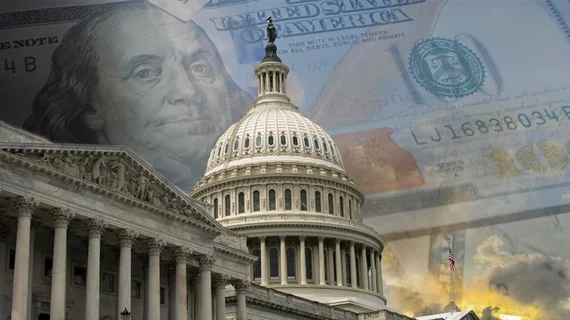Cardiologist-supported bill to stop ‘harmful’ Medicare cuts returns to Congress
A bipartisan bill designed to block recent Medicare payment cuts has been reintroduced to Congress after failing to pass in 2024. Will things be any different this time around?
If signed into law, the Medicare Patient Access and Practice Stabilization Act of 2025 would cancel out the 2.8% Medicare payment cut that went into effect Jan. 1 and provide a payment boost to help physicians manage their patients in the face of inflation.
“Physicians in America are facing unprecedented financial viability challenges due to continued Medicare cuts. Access to affordable and quality health care for millions of seniors is in severe jeopardy,” Rep. Greg Murphy, MD (R-North Carolina), said in a statement after he and nine other House members introduced the bill. “Doctors see Medicare patients out of compassion, not for financial gain. The cost of caring for a Medicare patient far outpaces the reimbursement that physicians receive for seeing them. On top of that, the expense of providing care continues to rise due to medical inflation.”
“The Medicare Patient Access and Practice Stabilization Act would ensure that providers are not penalized by harmful cuts while adjusting reimbursements for inflation,” added Rep. Jimmy Panetta (D-California). “By passing this bipartisan legislation, we will protect seniors' access to quality care and support the providers who make it possible.”
The American College of Cardiology (ACC) and other cardiology groups have been asking Congress to help put an end to Medicare payment cuts for years now. These cuts, which are finalized at the end of each year when the Medicare Physician Fee Schedule is finalized, result in cardiologists and other physicians receiving smaller reimbursements for the services they provide to Medicare patients.
Medical societies support the new bipartisan legislation
U.S. medical societies have thrown their support behind all recent attempts to put the constant Medicare cuts to an end, and that appears to be the case once again with the Medicare Patient Access and Practice Stabilization Act of 2025. In fact, the American Medical Association (AMA) and Medical Group Management Association (MGMA) both issued brand new statements as soon as the legislation was officially announced.
“This legislation would begin to roll back the cuts physician practices have faced over the last four years while we all have experienced high inflation,” AMA President Bruce A. Scott, MD, said in the group’s statement. “As evidenced by this bipartisan legislation, lawmakers know the trend is unsustainable and, if left unaddressed, will ultimately harm their constituents. Patient access to care and practice sustainability are not partisan or geographical issues. It’s an urgent national issue that demands immediate attention from Congress.”
The AMA statement emphasized that the continuing resolution keeping the U.S. government open only runs through March 14. The group believes any spending packages passed to keep the government open past that date should include an end to these annual cuts—and it asked physicians concerned about this issue to speak up and make sure their voices are heard.
“Physicians are healers first, but we are asking them to become vocal advocates for their patients over the next 45 days by contacting their members of Congress and urging them to include this bill in the next spending package,” Scott said. “Patients, particularly Medicare recipients and anyone with a family member on Medicare, should do likewise”
The MGMA statement, meanwhile, pushed for the “swift passage” of this new legislation.
“Physician practices are now a month into the new year, facing uncertainty and financial shortfalls from the congressional failure to reverse the 2025 Medicare fee schedule cuts,” Anders Gilberg, MGMA’s senior vice president of government affairs, said. “These cuts have negatively impacted the viability of their Medicare business, commercial contracts tied to Medicare rates, as well as Medicaid reimbursement in states that use Medicare as a benchmark. With nearly 80% of all physicians now employed by facilities and larger entities, Medicare beneficiaries in areas of the country that rely solely on community-based medical practices are especially vulnerable to access issues. Without immediate congressional action on this important legislation, more and more physician practices will be forced to close their doors, unable to keep up with rapidly rising staff salaries, rent, and administrative costs.”
The ACC also shared its thoughts on the reintroduced legislation, highlighting the "significant strain" Medicare cuts have placed on cardiology practices throughout the United States.
"Passing this legislation would send a powerful message to policymakers: we cannot continue to slash reimbursement to clinicians who provide lifesaving services," ACC President Cathleen Biga, MSN, said in the statement. "Year after year of devaluing these essential services creates financial instability for clinicians, jeopardizing patients’ access to necessary cardiovascular care."

